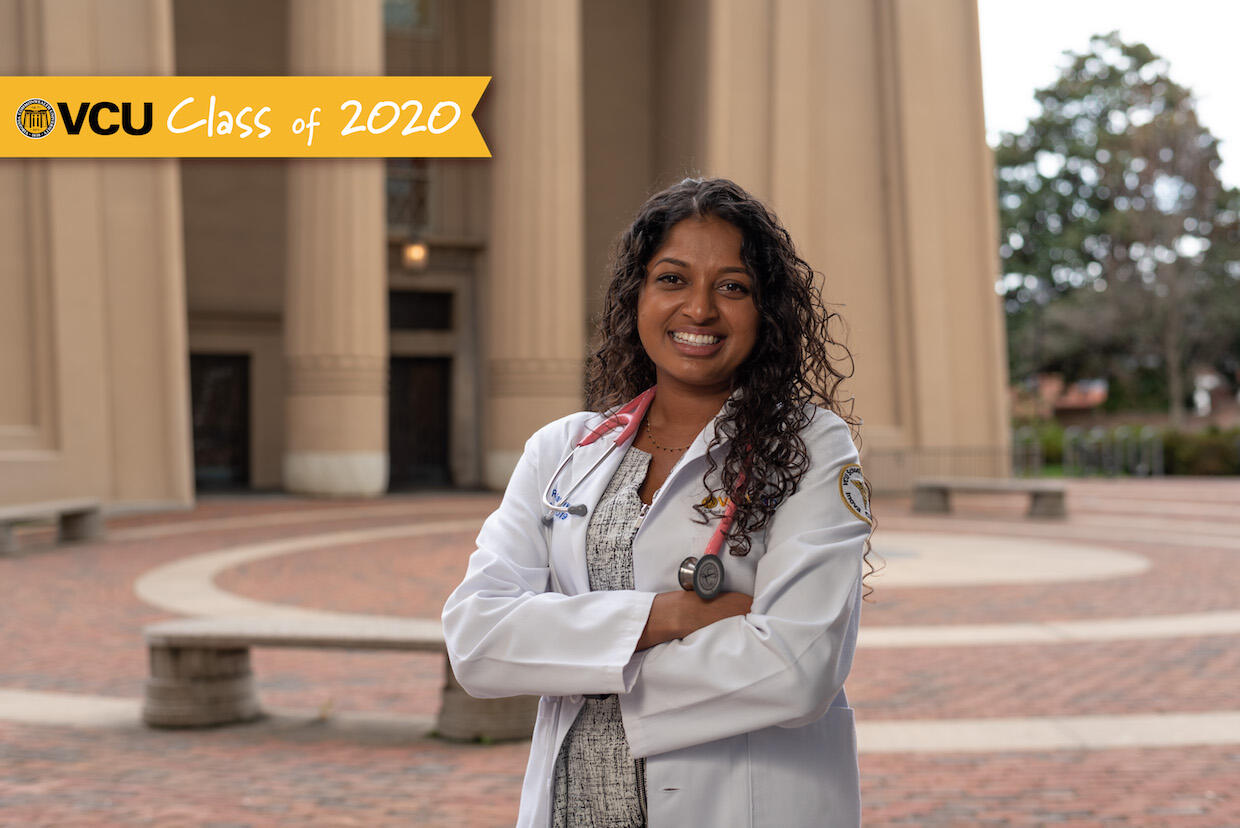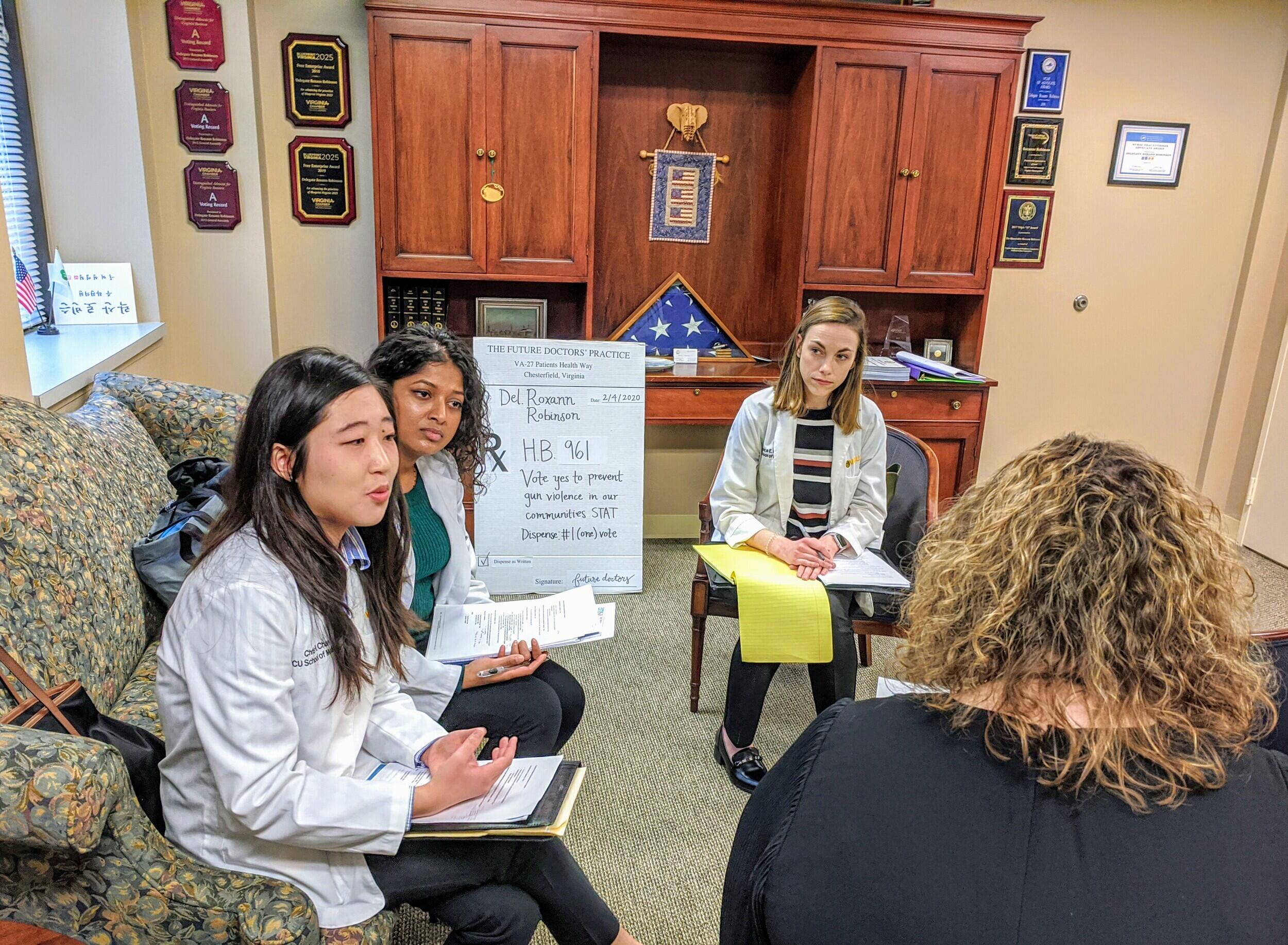
March 25, 2020
Class of 2020: One VCU medical student turned Virginia’s Capitol into a classroom to fight for her future patients
Share this story
Though VCU will not hold an in-person commencement ceremony this spring due to the COVID-19 pandemic, the university will host a virtual commencement celebration May 8 and spring graduates will be invited to participate in the university's formal commencement ceremony on Dec. 12. In these challenging times, thousands of students will earn their degrees this spring. These are some of their stories.
Students in white medical coats, led by their instructor — a fellow student — walked into Virginia’s General Assembly building early this semester, ready to meet with legislators on issues of importance to their patients’ overall health.
One senator stepped out of a committee meeting to meet with the students and asked to get a photo with them in their white coats. It was a reminder of the power the coat holds as a symbol of authority and leadership.
The course’s instructor, Avanthi Jayaweera, knows the symbolic nature of the white medical coat, and what it represents, and she wants to use that power to advocate for equitable policy solutions for her future patients.
“We are seen as trusted messengers in society,” Jayaweera told her fellow future physicians. “Through advocacy, we’re contributing an objective perspective to the broader discussion of health policy and community health. These white coats exude this power that we can use to protect our communities’ interests.”

Jayaweera, a fourth-year student at Virginia Commonwealth University School of Medicine, learned on Friday during national residency Match Day — while celebrating from her family’s home in Herndon, Virginia, and tuning in for a virtual match celebration with her classmates and professors — exactly where she will be using that power for good in the coming years. She will be a resident in the underserved track of the University of North Carolina at Chapel Hill’s Family Medicine Residency program.
“I am so thrilled to be joining a team that is just as committed to working with underserved communities as my experience has been with VCU,” Jayaweera said. “During my interview, we had discussions about bringing elements of the course I created at VCU into the residency program to create additional avenues for advocacy for residents.”
During her time at VCU, Jayaweera completed a prestigious fellowship and created a new elective course, Physician Advocacy for the Underserved, to teach her fellow future physicians how to use their standing in the community to effect positive change and empower patients.
“Advocacy is not a voice for the voiceless,” Jayaweera said. “[Patients] have their voices; they just need the space to speak up, and as physicians, we can help bridge that gap and help drive forward more overarching solutions to address the socioeconomic and environmental factors that result in other downstream effects on health.”
Treating more than just the patient in front of you
Jayaweera first realized she wanted to become a part of the overarching solution for patients while working at a clinic in Christiansburg, Virginia, when she was an undergraduate at Virginia Tech. At the clinic, she sometimes had to tell patients they were ineligible for care at that facility. If they had transportation, these patients would have to go to the next-closest clinic, sometimes more than 45 minutes away. These interactions spurred her to pursue not just medicine but advocacy in medicine.
“As a physician, I can treat patients one by one,” she said, “but that’s not sustainable if all these patients are coming in without access to care because they're not eligible. … [At the clinic] I felt like I was this gatekeeper to good health. And to me, there shouldn’t be any eligibility criteria to see a doctor.”
Jayaweera was drawn to VCU School of Medicine’s four-year International/Inner City/Rural Preceptorship (I2CRP) program, which focuses on preparing students to work with medically underserved populations.

When she joined the I2CRP cohort, she got involved with VCU’s chapter of the American Medical Student Association and continued working on advocacy. Then, in 2018, she earned the American Medical Student Association’s Education and Advocacy Fellowship, awarded to just one medical student per year in the U.S.
“My medical training can only take me so far,” Jayaweera said in a 2019 interview while completing the fellowship. “If we want to strive for sustainable solutions for the community, we need to challenge ourselves to look at our system as a whole and analyze the intersection of policy and health.”
The fellowship gave Jayaweera the chance to explore connections between medicine and the political and social factors that affect individuals’ health. She spent a year shaping educational and advocacy programming while delving into issues ranging from health care access to global health equity, diversity and social justice.
“The AMSA fellowship helped me develop a better understanding as to how to approach and work alongside community leaders,” she said. “And especially as a future family physician, I knew this experience would help me become a better doctor.”
From student to teacher
Jayaweera brought many of the lessons she learned traveling the country back to VCU in the form of her student-led elective course, Physician Advocacy for the Underserved.
Her goal behind the course was to help the students — her peers — prepare to advocate for patients on topics that have an impact on their overall health. She based the elective off another student-led course at VCU School of Medicine and developed a curriculum.
Jayaweera hopes to share the curriculum nationally so her peers at other schools can lead their own courses on advocacy.
“Although other medical schools may have advocacy electives, what stands out with this elective is that Avanthi developed it based on feedback from fellow medical students — both the content of the elective, and the way it was taught,” said Mark Ryan, M.D., Jayaweera’s faculty adviser and medical director of the I2CRP program. “The elective also took advantage of VCU School of Medicine’s location in Richmond, near the General Assembly, to engage students in authentic advocacy experiences.”
For Physician Advocacy for the Underserved, each student selected an issue — in this cohort students chose gun violence prevention, reproductive rights and increases to the minimum wage — researched that issue, gathered patient stories, drafted letters to the editor and prepared, over the course of four weeks, to speak to a legislator in the General Assembly about that issue.

The course is a chance to strike up a conversation that legislators might not otherwise have so they can hear the stories of their constituents from the medical professionals who treat them. Students may not change a legislator’s mind on a particular issue after one visit, but Jayaweera tells her students that getting a commitment that someone will vote “yes” or “no” is not always the goal.
It’s a lesson that resonated with medical student Danielle Austen.
“One of the things that really draws me to politics … is knowing that it’s not just, ‘We can agree to disagree and just leave it at that,’” said Austen, a fourth-year student in the Family Medicine Scholars Training and Admission Track program. “I think it’s a lot deeper than that. When you really go down to the heart of the issue, a lot of [advocating for patients] comes down to basic necessities — the need to be respected and the need to be safe. And if you can understand where they're coming from, I think you can find a lot in common.”
Austen has a background in politics. She completed her undergraduate degree at VCU’s L. Douglas Wilder School of Government and Public Affairs.
“I think my political background has also shaped a bit about why I feel so strongly that physicians are obligated to do the work in politics to help their patients,” Austen said. “But when I realized I was going to go into family medicine, I felt even more strongly about that. … Being in family medicine in particular, I felt like it’s my responsibility even more to get the tools early on so that I can help advocate for my patients, not just as an attending or a doctor, but also as a resident.”
Passing the torch of advocacy
As Austen and her classmate — and instructor — Jayaweera head into their final months of medical education before their residencies begin, they both plan to focus on advocacy.
Jayaweera hopes to continue as an ally, partnering with community organizations while working as a primary care physician in a community health center to care for underserved populations. She sees the opportunity she had in creating this course as unique, and she is excited to see it continue at VCU next year with the help of Mary Lee Magee, I2CRP director and assistant clinical professor, and Jayaweera’s adviser, Ryan, an associate professor of Family Medicine and Population Health.
“I'm very thankful that VCU is receptive to student-led initiatives,” Jayaweera said. “VCU has always been such a strong supporter for introducing the student voice and for helping us create educational opportunities that will further complement our robust clinical training.”
The classmates Jayaweera taught this year will continue to train others as well. Toward the end of each course, after students complete advocacy skills workshops, they partner with the local American Medical Student Association chapter to host the same advocacy skills workshop for incoming students.
As Jayaweera and her students plan to retire their current white coats for new doctors’ coats, the training is just another way the graduating students pass on an understanding of the power that comes with their white coats and how to use it for the greater good.
Subscribe to VCU News
Subscribe to VCU News at newsletter.vcu.edu and receive a selection of stories, videos, photos, news clips and event listings in your inbox.







